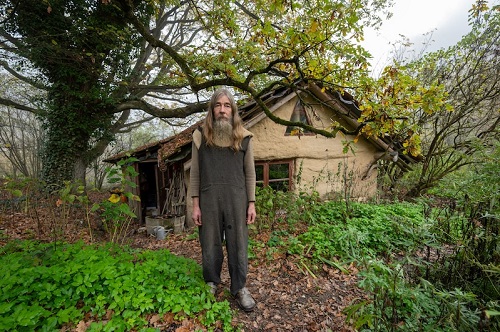By Birgit Reichert, dpa l Monday, January 30, 2023
GERMANY – Most people in Germany are worrying about soaring energy prices but not Friedmunt Sonnemann, who lives in a mud hut he built himself in a remote forest.
“None of this affects me,” he says about Europe’s energy crisis fuelled by Russia’s invasion of Ukraine, having spent 32 years in the forest near Longkamp, in south-western Germany near Luxembourg.
The hut lacks electricity or water but he insists he has all he needs. “I want for nothing,” says Sonnemann, long haired, with a beard. “This is the only way I want to live.”
He has temporary house-mates who help him out from time to time. They get the water they need for drinking from a nearby spring and use rainwater for the cooking and the washing. “The toilet is dry composting,” he says. They heat with wood.
“If there is a stove on in the room and the thermometer shows 14 degrees, that’s pleasant, we find,” he says.
When it is cold, Sonnemann says, they never heat the room to 20 or 21 degrees Celsius. “Under no circumstances,” he adds. “That would really be a waste.” The residents dress warmly in winter instead.
Sonnemann gathers the wood they need from his own areas or buys it outside, where he notices that prices are rising. “But I can live with that, it’s not so dramatic.”
People can get by with less than they think, says Sonnemann, who was born in the city of Bonn and grew up in Cologne. Of course, not everyone could live in the woods as he does, he says – Germany does not have enough forests.
But the way most people live in industrialized countries will not be sustainable in the long run, he believes. “There will definitely be a change in thinking.”
Sonnemann’s life is as unusual as the rare plants he grows on his 4 hectares of land. He harvests and sells the seeds and now has several hundred species, he says as he sprinkles the seeds of a dried evening primrose into a bowl.
His stock of seeds includes plants from generations ago. “There are also plants from great-grandmother’s times that would otherwise have disappeared,” Sonnemann says, naming Hunsrücker Schnitt chard, Hunsrücker Weiße runner beans and Blauhülsige, a long, thin purple bean.
It is especially important to preserve older cultivated plants in these times of climate change, he says, as they are able to flourish despite poor soil quality and in extreme weather conditions.
He also grows more exotic plants, such as courgettes from Croatia and huacatay, a wild marigold from the Andes in South America. “That is one of my favourite plants. It’s regularly used for soups and sauces, and we also make tea from it.”
People spend chunks of time on his farm and help out. “Right now there are eight of us,” Sonnemann says. They also come to get “some distance” from “the world outside,” he says.
“We don’t live in a separate world here. But the impact of what’s happening in the world right now is comparatively small.” Some of his helpers have even come to his farm from Mexico or Taiwan.
People do talk a lot about what is happening in the world but so far at least, the farm has been spared from Covid-19. “If I had it, I had a very mild bout,” says Sonnemann, who has only been to the dentist in recent years, bit not a doctor. He says he is his own healer.
But sometimes the outer world does intrude. Sonnemann spent years fighting to prevent the construction of the Hochmosel bridge near his farm. It now carries traffic that he can hear when the wind blows from the east. It is quite loud but he has no choice “but to come to terms with it,” Sonnemann says, though he slams the “destruction of the landscape” as “pretty terrible.”
His closest neighbours are the residents of Longkamp in the Bernkastel-Wittlich district and they are respectful about his farm in the forest.
“The work he does is accepted here,” says local Mayor Horst Gorges, praising Sonnemann’s efforts to preserve seeds and plants that might otherwise become extinct. However, few in the village really understand how Sonnemann lives so remotely.
He continues to develop his farm and has a second mud house on the land, along with a solar panel installed on a barn to run a washing machine or charge a cordless screwdriver now and again.
He and his fellow farmers do not only live on the herbs, pumpkin, apples and quinces they grow. “We also buy rice or noodles to go with it,” says Sonnemann.
He sees himself as a bon vivant, not a dropout or a hermit. “I don’t live alone and I didn’t drop out of the world, I made my way into this place.” Furthermore, he says, “I am not doing all this on my own, just for myself.”



